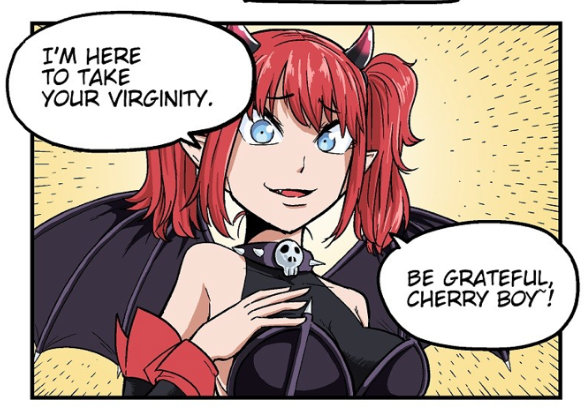Don’t click away! It’s not the title of a Jane Austen novel you’ve never heard of (well, I guess it could be if ‘Pride and Prejudice and Zombies’ is a real thing…). This week, we’re continuing our dive into all things Webcomic Demonic by moving on from Love Advice from the Great Duke of Hell to look another way demons can work their way into the hearts of their comic’s protagonists—the more, erm… direct approach.

Suck-a-what?
No, no; Succubi. It’s not as dirty as it… actually, it’s exactly as dirty as it sounds. Time for a quick history lesson:
Succubi (or Succubus in the singular) are a class of demon across a wide range of religions and folklore. Unlike Astaroth of last week’s Love Advice from the Great Duke of Hell or the earlier Mephistopheles from Faust, the powers and potential of Succubi are much more, well… specific

Historically, the reason for a Succubus doing what they do best was tied to notions of religious temptation and sin, particularly in the Judeo-Catholic traditions. Similar to Astaroth’s bargain with Paul from last week, the demon trades their *ahem* services for their victim’s soul—sometimes, whether they wanted it or not. In medieval Europe, folk tales abounded of Succubi (or Incubi, the male version of the demon) who would come to their victims at night, forcing the deed through magic and violence, and claiming rather than trading their unfortunate victim’s soul.

Although the phenomena are now understood as likely cases of ‘sleep paralysis,’ Succubi secured their place in the collective consciousness of the time as scary demons with a powerful sexual allure who consumed the souls of their nighttime-fun-time partners. And that’s where they stayed—until now.
My Succubus Girlfriend by R. Merryweather and Yoshitaka Maki
Recently, a different breed of Succubi have been arising in popular media; one that focuses on the sexy-fun-times aspect of the demon, and less on the horror of damming souls to eternal torment through one of humanity’s most intimate acts.
This is particularly well-shown in My Succubus Girlfriend, a webcomic that follows the demoness Anastasia Von Drakenwell and her bumbling attempts to claim her first soul. Anastasia is less a terrifying demonic presence using sex as a tool for evil conquest, and more, well, cute about it.

Whether it’s a symptom of modern society’s shifting emphasis on the ‘shamefulness’ of sex, and it’s refocusing on the act as a fun activity between consenting adults, consent is a prominent theme in My Succubus Girlfriend. Although Anastasia can use her demonic powers on a wide range of men, she can only use it to claim a soul if both parties are equal participants in the deed—unlucky for her.
Mage and Demon Queen by ‘Color_Les’
The modernised-but-still-classic approach of My Succubus Girlfriend isn’t the only way that these sexy demons are being represented in Webcomics, however. Mage and Demon Queen by Color_Les (Kuru) presents an interesting inversion to the theme. Rather than the demon pursuing the human, in this case…

Malori’s indefatigable quest to win the heart of the cold and distant demon queen Velverosa mirrors much of the thematic and presentational approach shared by My Succubus Girlfriend. Living in a real-life RPG world, Malori constantly puts her literal life on the line to pursue her ill-fated romance, and it is clear that—if not in the Faustian sense—what she’s really after here is nothing less than her victim’s soul.

Initially believing that she was emulating demonic dating rituals, Malori’s attempt to beat the Demon Queen into loving submission closely parallel the historical Succubus’ approach. However, as the comic progresses, the importance of consent becomes a more and more prominent theme.

Malori’s realisation—and the turning point of the comic—succinctly reflects how the popular representation of Succubi have changed in modern fiction as society’s views on sex, romantic pursuit, and the supernatural have evolved over time: losing a part of yourself to another is no longer something to be feared, but something which can be wonderful. So long as it’s done with respect.
What do you think—would you hand over your soul for a night of happy fun times? Or do you know of some comics out there where the old representations of Succubi still hold true? Let us know in the comments below, or over on Facebook and Twitter, and until next week always remember: don’t sleep with the clickbait!
